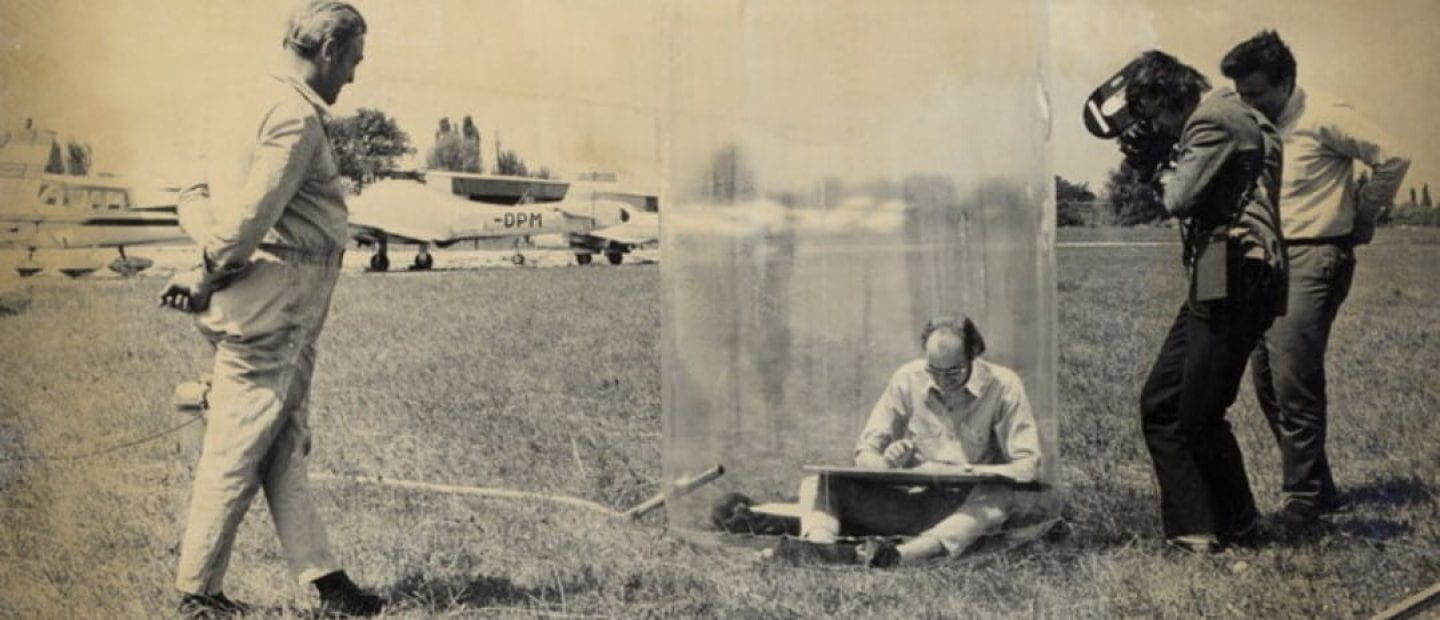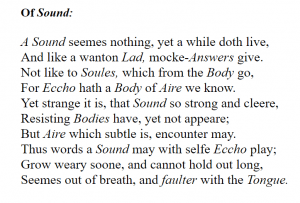We are Sudamerican Rockers: Vocalizations in the Protest Song
You have just watched the first music video ever played by MTV en Español, aired in 1993.[i]
In my presentation, I will focus on the segment I shared from the song “We are Sudamerican Rockers,” originally released in 1987, by the influential Chilean band Los Prisioneros [The Prisoners] (1).[ii] Most studies about popular Chilean music focus on la canción de protesta or the “protest song” (literally, the song of protest).[iii] The protest song, which includes “We are Sudamerican Rockers,” refers to music whose lyrics reflect an explicit social and political commentary. To consider a wider framework of dissidence beyond lyrics, I interpret Los Prisioneros in “We are Sudamerican Rockers,” as upholding vocal mechanisms of protest—urgent, authoritative, and brash chanting sounds, often in unison. The protest noises reoccur throughout this song and in other singles by the band (2). In effect, Los Prisioneros articulate a becoming of rebellion vis-à-vis their protest tone and delivery (3). The group’s voice, not just speech, allow for a subversion of the status quo.
The band was formed in Santiago, Chile in 1979 by Jorge González, Miguel Tapia, and Claudio Narea (4). The band rose to fame during the adaptation of neoliberalism by the military dictatorship of Augusto Pinochet, a milieu in which the regime tried to limit the reach of leftist-slanting music to Chile’s youth (5). Los Prisioneros became known for coding British-American inspired music with working-class Chilean culture; the band embraced imitation, if anything they indulged in the irony (6).
When you first hear Los Prisioneros ‘singing’ in “We are Sudamerican Rockers,” your attention is drawn to their bare voice, and not the lyrics (whether one understands the Spanish or not). The irreverent chanting performed separately and in unison gives you the impression that the band is putting forth a cause. As is understood, “Protest is an action preoccupied with the amplification of a message—waiting to make sure it is heard.”[iv] And protest is intrinsically tied to sound. The words chanted change, but the sound inflations are repeated. This creates a loop, common in contemporary protests aimed at mobilizing change. It is unsurprising then that Los Prisioneros are known for articulating a new space between popular music and politics.[v] The delivery in “We are Sudamerican Rockers” could be imagined as a call to action. An urgent call against what González, the writer of “We are Sudamerican Rockers,” saw as 1970s Chilean apathy to the regime’s abuse, the worsened inequality, and U.S. influences.[vi]
Opposed to bands that self-identify as underground, Los Prisioneros defended a rebellion against a rebellion: “We are commercial, we want to reach all people…We don’t wish to be reduced to a group of intellectuals.”[vii] Were Los Prisioneros more interested in inspiring the Chilean youth than provoking the regime directly? In an interview for the book Maldito Sudaca, the Chilean sociologist Tomás Moulián suggests Los Prisioneros were never about rock, in the Rolling Stones sense, but about a populist sensibility.[viii] I infer that without the band’s signature confrontational pitch the song, “We are Sudamerican Rockers,” would not have garnered its anthem status for young Chileans (7).[ix] The word anthem has come to be known as inspirational music with the purpose of symbolizing a nation, group, or cause.[x] The demonstration-like chants in the song rise from self-called ‘proletariats,’ calling to fellow ‘proletariats.’[xi] The register of the voices positions the band in opposition to the elites but in support of the working-class.
To echo Adriana Cavarero, “…the voice plays no trick as opposed to speech.”[xii] The voice of Los Prisioneros in “We are Sudamerican Rockers” cannot be disguised—the band have a message to deliver. What Los Prisioneros say does not contradict the voice they say it in. The lyrics in the clip translate to:
They’re beautiful sounds / that leave stores / that light up people and move their feet / marching drums, tuned guitars / skeptical voices that sing about politics (8).
The band speaks about the voice’s power to rally the people. The song as a whole is a parody of the music star in Latin America, who lives overshadowed by the Euro-American rockstars, uncensored by their governments. We hear how their voices reproduce the meaning of the lyrics in all its self-deprecation and mockery. In “We are Sudamerican Rockers” it is the voice in itself removed from words that becomes a resistance. For the band, it is also vocalizations that incite change. As Los Prisioneros chant in the chorus of one of their most popular songs, “Here comes the force, the voice of the 80s” (9).[xiii]
For those who are interested, peek my playlist here.
Notes
- A few unconnected thoughts. All translations are mine unless otherwise noted. “We are Sudamerican Rockers” is an Anglicization of the Spanish word sudamericano (South American). “We are Sudamerican Rockers” was featured in Los Prisioneros’ third album La Cultura Basura (Trash Culture). Due to government censorship, Los Prisioneros released a Chilean and Latin American version of the album. By releasing a separate Latin American version, the band could promote the record outside of the dictatorship’s control. In this presentation, I mainly explore the nuances of the first 40-seconds of the music video, focusing on the song not the visuals. However, I do think the aesthetics add a fun angle, especially the eggs filled with paint thrown at the band. Egging is a well-known form of protest, including those thrown at protesters. The band is also dressed like ‘greasers’, which suggests mimicry of a working-class subculture aesthetic.
- Urgent and authoritative chanting is also found in the following songs by Los Prisioneros (this list is not complete): “La Voz de Los 80,” (The Voice of the 80s) “Maldito Sudaca,” (Damned Latino) “Corazones Rojos,” (Red Hearts, and “Nunca Quedas Mal Con Nadie” (You Never Upset Anyone).
- Here, I loosely draw from thinker Adriana Cavarero in For More Than One Voice to further this interpretation. Given that sounds are transient, “What characterizes sounds is not being but becoming.” [xiv] In my interpretation I hope to emphasize the resonance of voice not only an appreciation of speech, as in voice as a means of signification.
- The Band was active between 1984-1991 and 2001-2006.https://www.discogs.com/artist/884977-Los-Prisioneros
- Despite the censorship, the band’s music was spread outside of state-controlled TV and radio stations + For those who wish to learn more about the connection between oppression and music in Chile, an archived New York Times article (1983) on Pinochet’s censorship and the Chilean youth’s disenchantment: https://www.nytimes.com/1983/07/03/world/music-sparks-political-protest-of-chile-youth.html
- A line in “We are Sudamerican Rockers:” “Plagiando y copiando como todos los demás” (Plagiarized and copied like everyone else). Los Prisioneros mock themselves for copying American and European bands. Parody of North American imperialism is exemplified in the following Los Prisioneros songs: “We are Sudamerican Rockers,” “Latinoamérica Es un Pueblo al Sur de Estados Unidos” (“Latin America is a Town South of the United States”) “Independencia Cultural” (“Cultural Independence”) and many more.
- For those interested in a more contemporary angle to my presentation, a March 2020 Economist article on Chile and protest anthems: https://www.economist.com/books-and-arts/2020/03/12/demonstrators-in-chile-are-looking-to-the-past-for-their-soundtrack
- Lyrics from “We are Sudamerican Rockers”: Son hermosos ruidos/que salen de las tiendas /atraviesan a la gente y les mueven los pies / baterias marchante, guitarras afinadas / voces escépticas que cantan de política.
- From Los Prisioneros song “La Voz de los ’80” (The Voice of the 80s): Ya viene la fuerza /la voz de los ochenta.
SOURCES
[i] Paola Capó-García.“Video: Los Prisioneros’ ‘We are Sudamerican Rockers’ in Chilean Sign language.”https://remezcla.com/culture/video-los-pzcrisioneros-we-are-sudamerican-rockers-in-chilean-sign-language/. Remezcla. May 2013.
[ii] Los Prisioneros. “We are Sudamerican Rockers.” Track 1. La Cultura de Basura. Latin American Version. EMI Music. 1987. https://www.youtube.com/watch?v=9NwXMDbrqA0
[iii] Irene Depetris Chauvin. “De Electrodomésticos a Los Prisioneros: La música electrónica, el pop y la crítica del ‘milagro Chileno.”(From Electrodomésticos to Los Prisioneros: Electronic music, pop, and the critique of the ‘Miracle of Chile.’” Studies in Latin American Popular Culture. Vol 34. May 2016. 57. She writes, “Una buena parte de los estudios sobre música popular chilena se ha focalizado de manera casi exclusiva en el estudio de la “canción de protesta”, música cuyas letras refl ejan un explícito mensaje político y social.”
[iv] Lawrence English. “Voices, hearts, and hands – how the powerful sounds of protest have changed over time.” The Conversation. January 9, 2020. https://theconversation.com/voices-hearts-and-hands-how-the-powerful-sounds-of-protest-have-changed-over-time-140192
[v] Depetris Chauvin, “De Electrodomésticos a Los Prisioneros.” 63. She writes, “…su música creó un nicho de mercado que, lejos de abrazar acríticamente la doctrina neoliberal, supuso una nueva articulación entre música popular y política”
[vi] Daniel Party. “Beyond ‘Protest Song’: Popular Music in Pinochet’s Chile (1973-1990).” Music and Dictatorship in Europe and Latin America, edited by Roberto Illiano and Massimiliano Sala. Turnhour: Brepols Publishers, 2010. 680.
[vii] Gustavo Viscarra and Carlos Lettuce. “Los Prisioneros: Acorralados.” (Los Prisioneros: Cornered). La Bicicleta (magazine). April 22, 1986. 15.
[viii] Emiliano Aguayo. Maldito Sudaca. Conversaciones con Jorge González: La voz de los ’80. Santiago de Chile: Red Internacional del Libro. Identikit Series. 2005. 85.
[ix] Depetris Chauvin, “De Electrodomésticos a Los Prisioneros,” 64. She writes (implying how the band’s music symbolized a cause and young Chileans), “Los Prisioneros fueron, sin lugar a dudas, la “voz de los ochenta” (Los Prisioneros were, without a doubt, ‘the voice of the eighties.’) This quote refers to their popular song, also an anthem in Latin America, “La voz de los 80.”
[x] “A Note on the History of Anthem.” Merriam Webster. https://www.merriam-webster.com/words-at-play/word-history-of-anthem
[xi] Depetris Chauvin, “De Electrodomésticos a Los Prisioneros,” 64. She writes, “…las canciones de Los Prisioneros dividían el mundo entre ricos y pobres y se consideraban ellos mismos como los reivindicadores de los ‘ver daderos proletas’.”
[xii] Adriana Cavarero. For More than One Voice: Toward a Philosophy of Vocal Expression. Translated by Paul A. Kottman. Stanford: Stanford University Press. 2005. 24.
[xiii] Los Prisioneros. “La voz de los ‘80.” Track 1. La Voz de los ’80. Sello Fusión, EMI Music. 1984. https://www.youtube.com/watch?v=yWP__YnKzsI
[xiv] Cavarero, For More than One Voice, 37.




Leave a Reply
You must be logged in to post a comment.